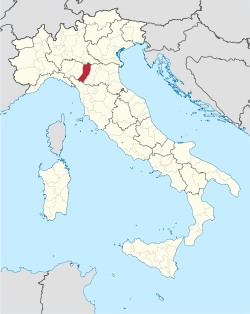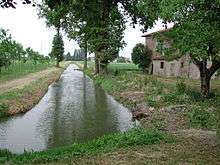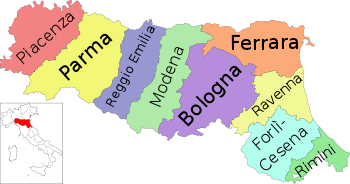Province of Reggio Emilia
| Province of Reggio Emilia | |
|---|---|
| Province | |
 Ducal Palace in Reggio Emilia, the provincial seat | |
 Map highlighting the location of the province of Reggio Emilia in Italy | |
| Country |
|
| Region | Emilia-Romagna |
| Capital(s) | Reggio Emilia |
| Comuni | 42 |
| Government | |
| • President | Giammaria Manghi (PD) |
| Area | |
| • Total | 2,291.26 km2 (884.66 sq mi) |
| Population (30 June 2017) | |
| • Total | 531,942 |
| • Density | 230/km2 (600/sq mi) |
| Time zone | UTC+1 (CET) |
| • Summer (DST) | UTC+2 (CEST) |
| Postal code |
42010-42025, 42028, 42030-42035, 42037, 42039-42049, 42121-42124 |
| Telephone prefix | 0522, 0536 |
| Vehicle registration | RE |
| ISTAT | 035 |
The Province of Reggio Emilia (Italian: Provincia di Reggio nell'Emilia) is one of the nine provinces of the Italian Region of Emilia-Romagna. The capital city, which is the most densely populated comune in the province, is Reggio Emilia.
It has an area of around 2,292 square kilometres (885 sq mi) and, As of 2017, has a population of 531,942. There are 42 comuni (singular: comune) in the province.[1] Rolo, the smallest commune in the province by area, is the commune farthest to the East. Ventasso is the commune farthest to the West. The border towns of the Province are Ventasso, which is the smallest commune by population, to the south and Luzzara in the north. Luzzara is the second largest commune in Emilia-Romagna and has the highest number of foreign nationals in the region.[1]
The province is home to the historical Canossa Castle, property of the countess Matilde; it is where the Walk to Canossa of Henry IV occurred. Representatives of the free municipalities of Reggio, Modena, Bologna and Ferrara met in Reggio Emilia's Sala del Tricolore in 1797 to proclaim the Repubblica Cispadana, adopting the three colour green-white-red flag to represent their newly formed Republic; it was later adopted in 1848 as the national flag.[2]
Education

Four faculties of the University of Modena and Reggio Emilia are located in Reggio Emilia. The Faculty of Engineering and Agriculture was established in Reggio Emilia in 1998, followed by the Faculties of Communication Sciences and of Education Sciences.[3] It is home to the Orto Botanico dell'Università di Modena e Reggio Emilia.[4]
The Reggio Emilia approach to preschool education was started by the schools of Reggio Emilia after World War II and it's well-known all over the world, being one of the most advanced systems at present times. It is based and inspired on theories of Malaguzzi, Bruner, Vygotsky, Dewey, Piaget and Gardner. Reggio Emilia helds the International Centre Loris Malaguzzi, a modern structure where the Reggio Emilia approach is implemented, exported and spread around the world.[5]
Sports
With sports arenas including the Stadio Giglio and Palabigi, Reggio Emilia is home to the basketball team Pallacanestro Reggiana.[6] The Camparini Gioielli Cup is a yearly challenger-level tennis tournament played on clay in Reggio Emilia.[7] A.C. Reggiana 1919 is the historical soccer team of Reggio Emilia, at the moments plays in the third national soccer league Prima Divisione.Stadio Giglio (actual attendance is 29.650) is the home play ground for A.C. Reggiana 1919.[8]
See also
References
- 1 2 "Provincia di Reggio Emilia". Comuni-Italiani.it.
- ↑ Official Tourist Information Site of the Municipality of Reggio Emilia, Accessed 10 July 2011. Archived 13 August 2011 at the Wayback Machine.
- ↑ University of Modena and Reggio Emilia (UNIMORE), Brief History of the University, Accessed 10 July 2011.
- ↑ L’Orto Botanico dell'Ateneo di Modena e Reggio Emilia, Accessed 10 July 2011.
- ↑ Accessed 10 July 2011.
- ↑ "Sito Ufficiale della Pallacanestro Reggiana - Home". pallacanestroreggiana.it.
- ↑ TennisChallenger.net Camparini Gioielli Cup (Reggio Emilia Challenger) Information, Accessed 10 July 2011. Archived 30 September 2011 at the Wayback Machine.
- ↑ "Italy - AC Reggiana 1919 - Results, fixtures, squad, statistics, photos, videos and news - Soccerway". soccerway.com.
External links
| Wikimedia Commons has media related to Province of Reggio Emilia. |

